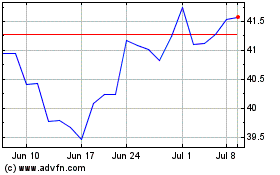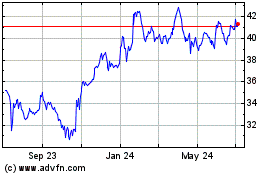By Jack Nicas, Jack Marshall and Suzanne Vranica
AT&T Inc., Verizon Communications Inc. on Wednesday joined a
growing number of companies pulling much of their advertising from
Google, expanding a controversy over the internet giant's ad
placements on objectionable content and deepening the financial
impact on the company even after it announced measures to assuage
concerns.
The new moves by advertisers amplify a problem for Google that
had been centered in the U.K., and suggests the Alphabet Inc. unit
is finding it harder than expected to quell the backlash. The
crisis has created an opening for some advertisers to press Google
for long-sought changes, while highlighting its complicated
relationship with some of its customers. AT&T and Verizon, for
example, in addition to being big advertisers, are building online
video and ad services to compete with Google.
The two wireless carriers and pharmaceutical company
GlaxoSmithKline PLC suspended advertising spending on Google except
for search, encompassing all ads on Google's YouTube site and the
more than two million third-party websites in Google's advertising
network. Johnson & Johnson and rental-car firm Enterprise
Holdings Inc. said they were canceling advertising on YouTube.
Distiller Beam Suntory Inc. said it also canceled some advertising
with Google.
The companies said the suspensions were in response to evidence
that Google placed their ads on extremist YouTube videos.
"We are deeply concerned that our ads may have appeared
alongside YouTube content promoting terrorism and hate," AT&T
said in a statement, adding that its move would last "until Google
can ensure this won't happen again." AT&T declined to disclose
how much it spends on YouTube, but a person familiar with the
matter said AT&T is among the video site's top customers.
On Tuesday, Google unveiled changes to its policies and
enforcement designed to keep ads away from controversial sites and
videos, after brands such as the British newspaper the Guardian,
HSBC Holdings PLC and L'Oréal SA reduced their ad dollars within
the past week.
Verizon said in a statement that it is working with digital-ad
partners "to understand the weak links so we can prevent this from
happening in the future." Verizon's suspension applies to all
so-called programmatic advertising, which uses software to
automatically place ads across the web. Such advertising includes
ads on YouTube and Google's network of third-party sites.
A Google spokeswoman said it is working on measures "to further
safeguard our advertisers' brands." She declined to comment on
specific companies.
For Google, the world's largest advertising platform, the uproar
has spiraled from a public-relations issue into a crisis that some
analysts say could hit its bottom line. Serving ads on third-party
websites brought in revenue of $15.6 billion last year, or 17.3% of
Alphabet's overall revenue. Alphabet doesn't disclose YouTube's
revenue, but has signaled it has been a major driver of growth in
recent quarters. The controversy hasn't touched the company's main
moneymaker, ads atop search results.
"This probably gets worse before it gets better for Google,"
said Brian Wieser, Pivotal Research Group analyst, who downgraded
Alphabet's stock to hold from buy on Monday because of advertisers'
reactiony.
Google's recent policy changes "did nothing to alleviate
concerns."
The advertising backlash began in the U.K. following a report in
the Times of London about videos made by supporters of terrorist
groups. Subsequently, it was found that many American brands
continued to be shown alongside controversial clips, prompting the
wave of ad cancellations Wednesday.
Some of the loudest voices stoking Google's controversy are
companies with axes to grind with the tech giant: telecom companies
that view themselves as rivals of Google in online advertising,
publishers and media companies that have watched Google suck up ad
dollars, and marketers that do battle regularly with Google and see
a chance in the crisis to push for changes.
"We've been talking about brand safety for 20 years. It's not a
new phenomenon," said David Cohen, president of Interpublic Group
of Cos Inc. ad-buying group Magna Global in North America. "In a
world where so much content is being produced, it's really
difficult and challenging to come up with a 100% solution. That
said, we have had a couple conversations with Google over the past
couple of days. We're exerting pressure to do more."
In the past several days, executives at the biggest media-buying
agencies have been fielding calls from marketers eager to find out
more about whether their own ads have landed in foul places, not
just in the U.K. but world-wide.
Meanwhile, a global beverage company has pulled most of its ad
spending from Google, outside of search, in 30 countries including
the U.S., according to a person familiar with the situation. In a
few smaller markets, the beverage giant will continue to buy
inventory from "Google Preferred," which are top YouTube channels
that Google markets as some of the site's most brand-friendly
content, the person said.
Agency executives have been in talks with Google to press for
more details on the new tools it will provide. Industry executives
have long called on Google to give them greater control over where
their ads appear, and more visibility into its ad systems. But they
feel the high-profile nature of the current flare-up gives them a
strong change to make that case.
Mr. Cohen said Interpublic is asking for more specifics about
the brand-safety measures Google said it would implement, and that
it wants Google to be more accessible to third-party companies that
verify the safety of web-ad inventory on behalf of brands.
Havas SA, the world's sixth-largest ad-agency holding company by
revenue, last week pulled ads for its clients in the U.K. off
Google properties. Yannick Bollore, Havas's chief executive, said
the ad firm is working with some marketers to explore if they
should be removing ads everywhere in the world, not just in the
U.K. "Right now it is only discussions. I will know more in a
couple of days," he said.
As for why Havas hasn't already suspended advertising on Google
properties in other countries, Mr. Yannick said, "we had proof that
it happened in the U.K., and I haven't received any proof that it
happened in other markets."
Verizon has built up an online advertising business with the
acquisition of AOL in 2015 and has struck a deal to acquire Yahoo
Inc.'s core business. The combination would give Verizon roughly 2%
of the global digital advertising market in 2016, according to
eMarketer.
Like Google, AOL sells advertising that is automatically
distributed to third-party sites. AT&T, meanwhile, is
positioning itself as a budding competitor to Google as an
advertising platform, pitching its proposed merger with Time Warner
Inc. as a defense against Google's growing power in the
industry.
"Advertisers need more competition," Time Warner CEO Jeff Bewkes
said on an October conference call with analysts. "This will give
another outlet, not just the Google and Facebook one that's been
gaining all the traction."
--Ryan Knutson, Drew FitzGerald and Alexandra Bruell contributed
to this article.
Write to Jack Nicas at jack.nicas@wsj.com, Jack Marshall at
Jack.Marshall@wsj.com and Suzanne Vranica at
suzanne.vranica@wsj.com
(END) Dow Jones Newswires
March 22, 2017 20:07 ET (00:07 GMT)
Copyright (c) 2017 Dow Jones & Company, Inc.
Verizon Communications (NYSE:VZ)
Historical Stock Chart
From Mar 2024 to Apr 2024

Verizon Communications (NYSE:VZ)
Historical Stock Chart
From Apr 2023 to Apr 2024
